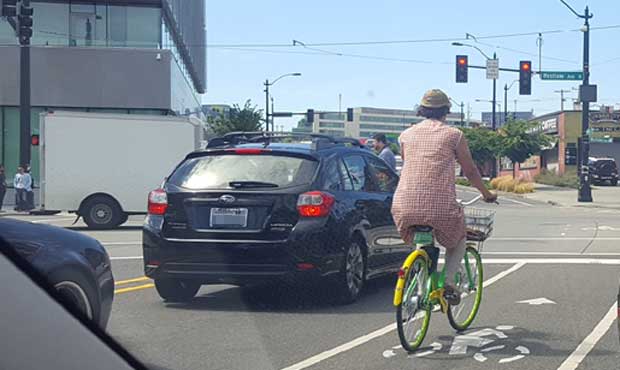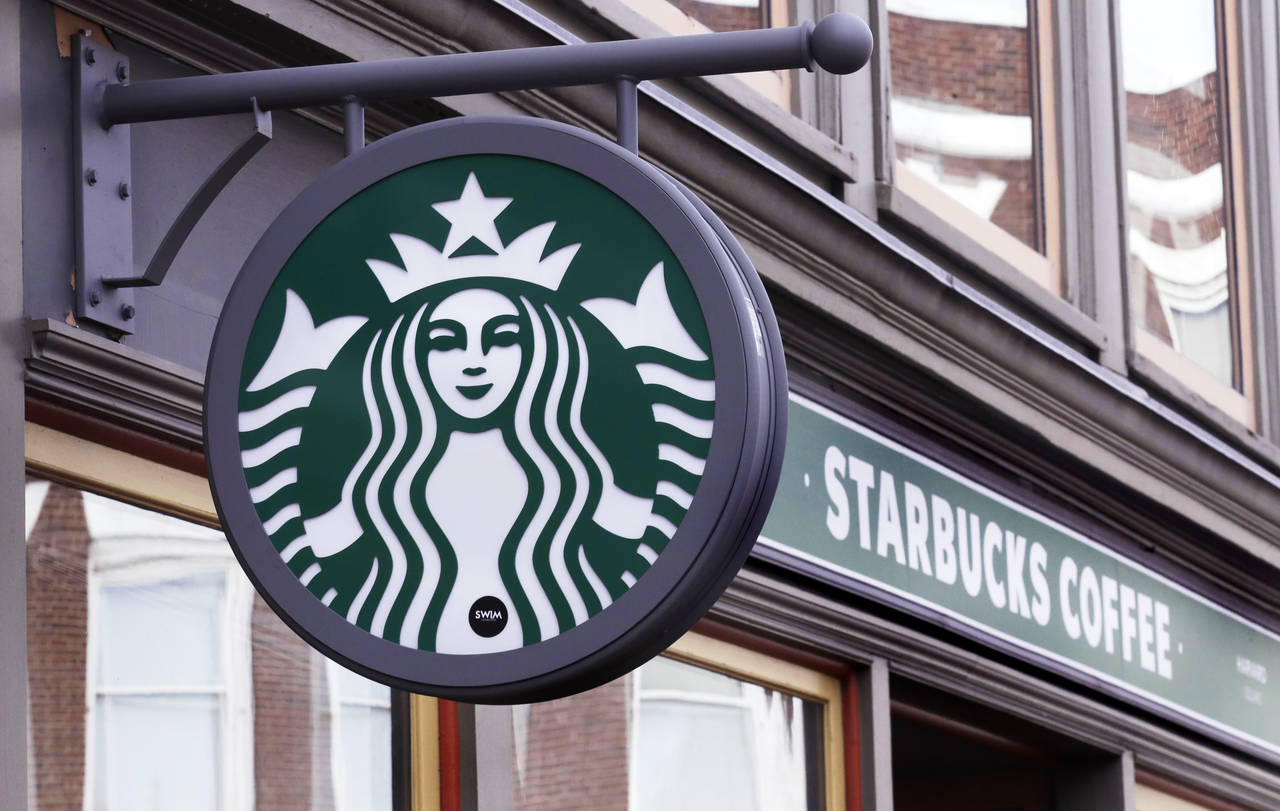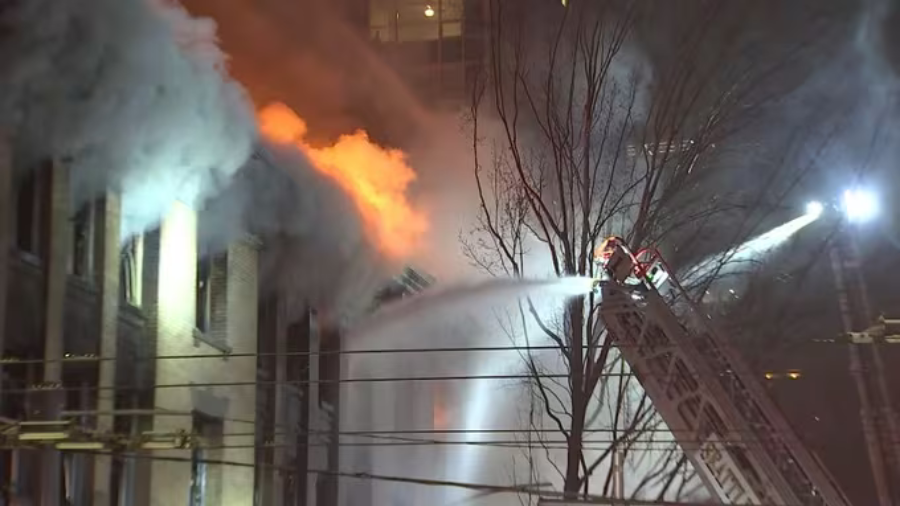Seattle makes bikeshares official, opens up to scooters and more
Jul 29, 2018, 8:00 AM | Updated: Jul 30, 2018, 5:40 pm

A bike share customer on the road in Seattle. (Kipp Robertson, MyNorthwest)
(Kipp Robertson, MyNorthwest)
The Seattle City Council approved new bikeshare permitting regulations Monday that could open the city up to more companies, and a lot more methods of travel from scooters to handcycles.
RELATED: Seattle bikeshare history 101
The ordinance doesn’t address lingering concerns council members say they want to tackle, such as riding bikes on sidewalks or enforcing helmets. More rules could be coming. What the council approved at its Monday meeting establishes permitting and fees associated with the bikeshare program moving forward. It comes after a yearlong pilot program testing the stationless bikeshare method.
Operating a bikeshare system in Seattle will now come with a heftier price tag than under the pilot — it’s also more expensive than SDOT previously reported when it announced future regulations for the system.
- $250,000 per vendor administrative fee (if four vendors apply), or
- $50 per bike or other device if there are less than four vendors applying to operate in town
- $224 for the issuance of a permit; $170 for a permit renewal
- $260 per hour for staff to review the street use permit
Seattle is planning for up to 20,000 shareable bikes on its streets. The council amended the rules, too, to accommodate disabled riders.
“The Seattle Department of Transportation has stated their intent to essentially double the number of permitted bikes they would allow from a maximum of 10,000 today to 20,000 going forward,” said Councilmember Mike O’Brien. “With up to four companies and each company could have up to 5,000.”
Bike parking
The council also modified the 2018 budget to provide $1 million for bikeshare-related activities. The ordinance notes that data collection for the bikeshare system requires special expertise. It also uses more staff time than previously realized and the city needs $370,000 to cover it. A total of $400,000 will be dedicated to constructing sidewalk bikeshare parking areas, which the city tested out in Ballard. It is estimated that it could pay for 150-200 bike parking stalls.
O’Brien and Councilmember Sally Bagshaw noted that beyond bike parking stalls on sidewalks, there are spaces within the 30-foot buffer zone around stop signs where car parking is prohibited in Seattle. These areas could be dedicated to bikes instead.
“One of the areas that is ripe for redeployment is the area near stop signs where parking is not allowed, but bike parking could be put in that place and when done right it would not restrict visibility around stop signs,” O’Brien said. “This ordinance increases the permitting fees for operators and will generate additional revenue to make the investments necessary to make (bikeshare) parking available. I don’t want to pretend that parking alone will solve (common complaints). A lot of this is behavioral and we need to establish the type of behavioral norms and we look forward to hearing from (SDOT) in the next month or so about how they plan to enforce that against the bikeshare companies.”
Seattle bikeshare plans
The bikeshare ordinance mentions a scenario with four bikeshare companies operating in town. Three companies — SPIN, ofo, and Limebike — have been doing business in Seattle since July 2017. It is suspected that JUMP is itching to get into the Seattle market as well with its electric bikes. That company has been courting city officials since the start of 2018.
But one of the companies is leaving Seattle as the new permitting fees come online. Geekwire reports that ofo is ceasing its operations in Seattle as it also lays off employees across the United States. The company has said that Seattle’s fees are too high for it to operate in town. Following the council passing the new bikeshare rules, ofo released this statement:
We appreciate the efforts of City Council and SDOT in crafting new requirements for dockless bikeshare in Seattle. The exorbitant fees that accompany these new regulations — the highest in the country — make it impossible for ofo to operate and effectively serve our riders, and as a result, we will not be seeking a permit to continue operating in Seattle. We’re incredibly disappointed to be leaving the first U.S. city to welcome ofo and thank the City for its partnership and support this last year.
Limebike has reported a different experience in the Seattle market and elsewhere. It plans to continue in Seattle under the new permitting system.
“Seattleites embraced Lime the moment we launched,” said Gabriel Scheer, Director for Strategic Development at Lime. “Since then, more than a third of city residents have had rides on our bicycles. We’ll absolutely be applying for bikeshare permits when they become available next month, and plan to continue to serve this city and beyond with viable, accessible and affordable mobility options.”
In its 13 months, Limebike has sold six million rides on its bikes around the world — more than one million were taken in Seattle, it’s most successful market. Limebike’s year one report also states:
- Seattle was the first market to hit 1 million rides on a stationless bikeshare
- 715,000 pounds of CO2 have been saved by using its bikes; more than any other city
- 74 percent of Seattle residents have a favorable opinion of stationless bikeshare
- Of the one third Seattle residents who have tried Limebike: 36 percent Hispanic and African American; 32 percent Asian; and 32 percent Caucasian
- A rider using Limebike products in conjunction with public transit would pay, on average, 80 percent less than the cost of owning and operating a personal vehicle
Scooters, handcycles, tricycles and more
The rules have a little more to them than the Seattle Department of Transportation has previously hinted at. Seattle’s sharing program now includes “shareable mobility devices, such as tricycles, handcycles, tandem cycles, electric scooters, and others.” Part of this has to do with providing sharable transportation for disabled residents.
Shareable scooters have been rumored to be among other coming shareable vehicles. Limebike, which already operates a bikeshare in Seattle, has an electric scooter model that it has been shown around town. Bird, another scooter sharing company, has already advertised for jobs in Seattle, seeking “chargers” for its shareable electric scooters.
It’s one sign of an expanded sharable industry in Seattle that will offer much more than bikes.













